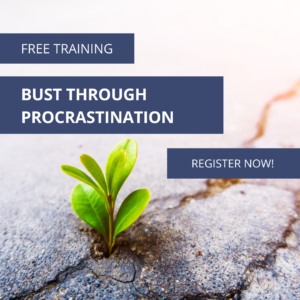Having just wrapped up leading my 5 Days to Freedom challenge on Facebook, I’m reflecting on a few things right now, including overwhelm.
Every day for five days, I did a live training to go over another step of my Weekly Planning That Works process, and answered a lot of great questions from people who were following along at home. Getting to engage with the True Focus community in real time was gratifying—and it reminded me of how much power there can be in making simple changes.
Everyone was implementing the Weekly Planning That Works process as the week went along, so each day I got to hear about breakthroughs and aha moments that people had had while working on the previous step. There were a lot of breakthroughs around one of the steps to this process: Making a to-do list dump. Sometimes we call this a “brain dump.” During this step, you get everything out of your brain and down on paper so you can visualize all the tasks that you want to get done. Everything that you need or want to get done over the next week goes down on the list.
Sounds simple, but this is one of the single most important things you can do to shut down overwhelm and move forward with accomplishing things.
The Surprisingly Simple Tool for Better Time Management
Overwhelm happens when you’re trying to keep track of dozens of things at once, and overwhelm tends to make us shut down and lose focus.
That’s why a writing implement—whether that’s pen and paper, or a whiteboard, or the Notes app on your phone—is the one tool that will help you immediately get relief from your time management and productivity challenges. We can use our brains to keep track of things, or we can use them for big-picture thinking. It’s really difficult to do both at the same time.
Think about what’s happening when you’re making a mental to-do list. Maybe you’re trying to remember all the emails you need to send, and thinking about what errands you need to run, and wondering whether you need to follow up with that client, and juggling a dozen other thoughts at the same time. You’re not actually accomplishing any of those tasks; you’re just trying not to forget about them.
Free Your Brain From Overwhelm
Getting your to-do list down on paper (or onto a screen) frees your brain from trying to hold onto all those tasks so you can use all your energy to do your best work and actually make progress on your goals. Again, it’s simple—but over and over again, I’ve seen how powerful this habit has been for my clients. I saw that in action during the challenge.
The other thing I’m reflecting on after the 5-day challenge is the power of social support. It’s one of those things that a lot of people took for granted before the pandemic, and now appreciate more than ever. Being cut off from a lot of our normal sources of support and human interaction has been one of the hardest parts of this experience.
Finding Community in Live Trainings
I’ve always loved doing live trainings, but there has been something special about them since the pandemic began. I’ve seen how they can help people find connection and encouragement from others who are in the same boat. Each day of the challenge, I saw strangers in the comments section “meeting” each other, celebrating each other’s victories and commiserating over each other’s struggles. I saw people offering to create accountability groups to help each other stay on track with time management goals. I saw people sharing tips and encouragement. It was a powerful reminder of how much value there is in community, and how much easier it can be to learn new skills when you’re doing it as part of a group.
I’ll be (virtually!) seeing some of those 5-day challenge participants again soon, as part of my Jump Start Your Productivity live workshop and home study. This is the program for anyone who needs in-depth instruction to break through their time management challenges.
If you’re motivated to make real change and learn how to create balance and peaceful productivity, I hope you’ll join us. Click here for more information and to register.
Gratefully,
Sarah
P.S. I recently got the opportunity to write more about procrastination and overwhelm in an article for Staples Connect—check it out by clicking here!
- Time Management Strategies to Help You Land the Big Clients You Want - April 17, 2024
- Stress Management for a Productive Spring: Are You “Normal”? - April 4, 2024
- 3 Things Realtors Can Control in a Busy Spring Real Estate Market - March 15, 2024



